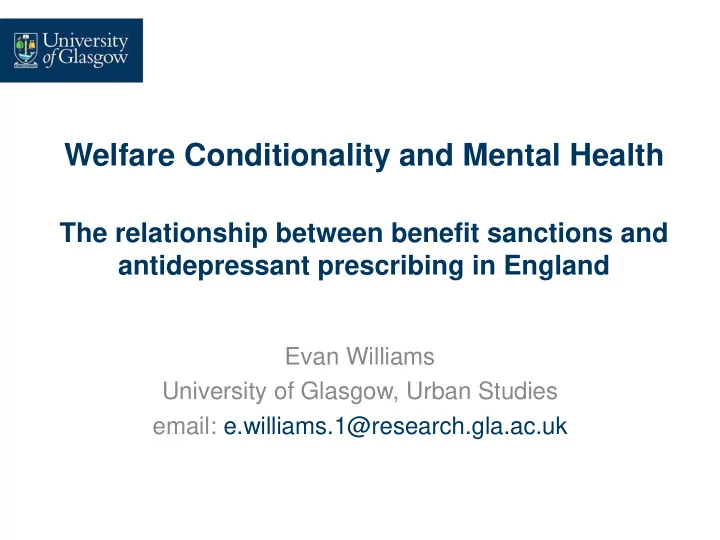

Welfare Conditionality and Mental Health The relationship between benefit sanctions and antidepressant prescribing in England Evan Williams University of Glasgow, Urban Studies email: e.williams.1@research.gla.ac.uk
Outline • Background • Data and Methods • Results and Discussion
Conditionality / Activation • ‘Benefit activation’ ( Clasen & Clegg, 2011): – work-related behavioural conditions o enforced through the threat and imposition of sanctions – international shift (Langenbucher, 2015) • UK and ‘ubiquitous conditionality (Dwyer & Wright, 2014): – unemployed; single parents; long-term sick and disabled; low-paid employment
Coalition Government (2010-15) • High imposition of JSA sanctions: – approx. a quarter (24%) of JSA claimants received at least one sanction (NAO, 2016a) – ‘great sanctions drive’ (Webster, 2016) • Increased length of sanctions (DWP, 2013) – prior to October 2012: one to 26 weeks – Welfare Reform Act 2012: four to 156 weeks
Figure 1 : monthly rate of JSA sanctions (per cent of JSA claimants), 2010-2015 Source : author’s calculations using DWP Stat-Xplore data
Impacts • Labour market: – short-term employment re-entry; longer-term wages, job stability and quality (Arni et al. 2013) – disengagement from both labour-market and benefit claiming (NAO, 2016b) • Non-labour market: – financial hardship (Peters & Joyce, 2006) – food bank usage (Loopstra et al., 2018) – third-party impacts (Watts et al., 2014)
Mental Health Impacts • Emerging evidence: – anxiety, depression and stress (Stewart & Wright, 2018) • Mechanisms (Sage, 2017): – material: four-week sanction = loss of over £230 (aged 18-24) and over £290 (aged 25+) – psychosocial: stress; loss of agency; and loss of social status (e.g. stigma)
Antidepressant Prescribing • A ntidepressant prescribing ≠ mental health • Research questions: – are benefit sanctions associated with higher rates of antidepressant prescribing? – does the relationship strengthen following the Welfare Reform Act 2012?
Data and Methods • Longitudinal ecological study: – local authority-level: 326 English LA districts – quarterly: 18 quarters o Q3 2010: availability of antidepressant data o Q4 2014: prior to national roll-out of UC – N = 5,832 local-authority quarters – fixed effects regression models
Data and Methods • Antidepressant prescribing: – Selective Serotonin Re-Uptake Inhibitors (SSRIs): first-line medication for depression and anxiety (NICE, 2015) – total antidepressant prescribing: additional items unrelated to depression / anxiety – item: single supply of a medicine, generally a month long (HSCIC, 2015) • Sanctions: – original adverse sanctions: underestimate of true figure – sanctions ≠ individuals • Rates per 100,000 population
Data and Methods Variable Source SSRI prescribing NHS Digital JSA sanctions DWP JSA claimants NOMIS / ONS Unemployment, Economic Inactivity, Employment Age Gender GVA Antibiotics prescribing NHS Digital Cardiovascular prescribing Deprivation DCLG Rurality Defra
Figure 2 : relationship between sanctions and SSRI prescribing 30,000 2 = 0.023 R 25,000 20,000 15,000 10,000 5,000 0 200 400 600 800 1,000 Sanctions per 100,000 population
Figure 3 : relationship between sanctions and SSRI prescribing (fixed effects regression estimates) 1 .5 0 -.5 Full Time Period Pre-Welfare Reform Post-Welfare Reform Act 2012 Act 2012
Robustness Tests • Falsification test: – test for omitted variables bias – cardiovascular drug prescribing (Barr et al., 2015): no statistically significant relationship • Granger-test for reverse causality: – sanctions Granger-cause SSRI prescribing (p < 0.002) – SSRI prescribing does not Granger-cause sanctions (p = 0.918)
Summary • Sanctions associated with increases in SSRI prescribing – relationship is stronger following the implementation of the Welfare Reform Act 2012 – indicative of adverse impacts on mental health – limitations to quantitative analysis e.g. ecological fallacy
Bibliography Arni, P., Lalive, R., & Van Ours, J. C. (2013). How effective are unemployment benefit sanctions? Looking beyond unemployment exit. Journal of Applied Econometrics , 28 (7), 1153-1178. Barr, B., Taylor-Robinson, D., Stuckler, D., Loopstra , R., Reeves, A., & Whitehead, M. (2015a). ‘First, do no harm’: are disability assessments associated with adverse trends in mental health? A longitudinal ecological study. Journal of Epidemiology and Community Health , jech-2015- 206209. Clasen, J., & Clegg, D., editors. (2011). Regulating the risk of unemployment: National adaptations to post-industrial labour markets in Europe . Oxford: Oxford University Press. Department for Work and Pensions. (2013). Jobseeker’s Allowance: overview of revised sanctions regime . London: Stationary Office. Dwyer, P., & Wright, S. (2014). Universal Credit, ubiquitous conditionality and its implications for social citizenship. Journal of Poverty and Social Justice , 22 (1), 27-35. Health and Social Care Information Centre, HSCIC. (2015). General Practice Prescribing Data FAQs . Available at: http://content.digital.nhs.uk/media/10048/FAQs-Practice-Level-Prescribingpdf/pdf/PLP_FAQs_April_2015.pdf Langenbucher, K. (2015). How demanding are eligibility criteria for unemployment benefits, quantitative indicators for OECD and EU countries . Paris: OECD Social, Employment and Migration Working Papers, No. 166. Loopstra, R., Fledderjohann, J., Reeves, A., & Stuckler, D. (2018). Impact of welfare benefit sanctioning on food insecurity: a dynamic cross- area study of food bank usage in the UK. Journal of Social Policy , 47 (3), 437-457. National Audit Office. (2016a). Benefit Sanctions . London: Department for Work & Pensions. National Audit Office. (2016b). Benefit sanctions: detailed methodology . London: DWP. NICE. (2015). First-choice antidepressant use in adults with depression or generalised anxiety disorder . Available at: https://www.nice.org.uk/advice/ktt8/chapter/evidence-context Peters, M., & Joyce, L. (2006). A review of the JSA sanctions regime: summary research findings . London: DWP. Sage, D. (2017). Reversing the Negative Experience of Unemployment: A Mediating Role for Social Policies? Social Policy & Administration . Stewart, A.B.R., & Wright, S. (2018). Final findings: Jobseekers . York: Welfare Conditionality Project. Watts, B., Fitzpatrick, S., Bramley, G., & Watkins, D. (2014). Welfare Sanctions and Conditionality in the UK . York: Joseph Rowntree Foundation. Webster, D. (2016). Explaining the rise and fall of JSA and ESA sanctions 2010-16 . Available at: http://www.cpag.org.uk/david-webster
Recommend
More recommend